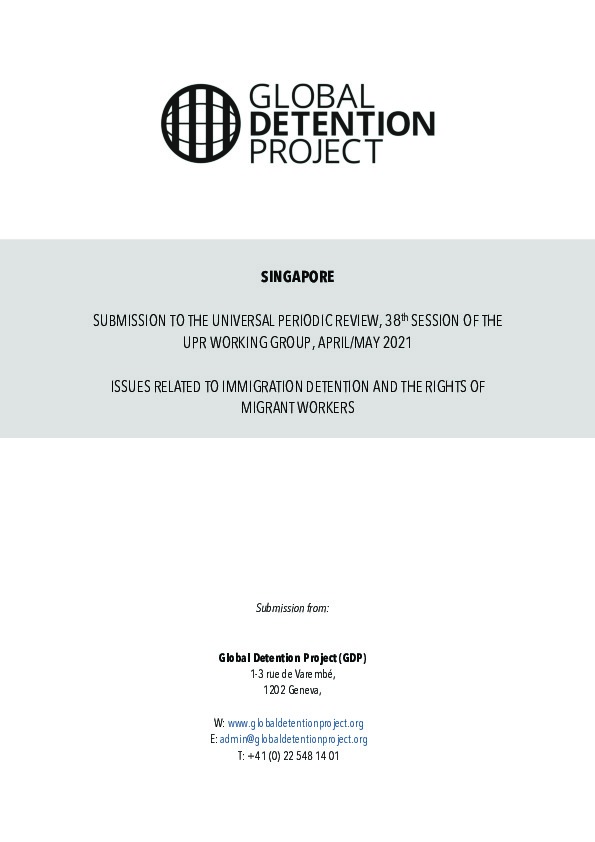Greece has faced enormous influxes of migrants, refugees, and asylum seekers. As arrivals have continued, authorities have taken steps to modify the country’s asylum law and restructure reception and detention facilities. During 2020, the country began relocating asylum seekers from island hotspots, banned the detention of children in police stations, and amended asylum detention laws. […]
Submissions & RecommendationsTargeted submissions and recommendations produced by the Global Detention Project, often in collaboration with partner organisations, for regional and international human rights monitoring mechanisms, treaty review bodies, interactive dialogues, consultations, and commissioned studies.
Targeted submissions and recommendations produced by the Global Detention Project, often in collaboration with partner organisations, for regional and international human rights monitoring mechanisms, treaty review bodies, interactive dialogues, consultations, and commissioned studies.
Joint Submission to the Universal Periodic Review: Hungary
Since the closure of its transit zones in 2020, Hungary has implemented a new, highly restrictive asylum procedure requiring all applicants to lodge their requests at consulates in Serbia or Ukraine. In a submission to the UPR, the GDP and Hungarian Helsinki Committee draw attention to this issue, along with other concerns related to migration detention and border enforcement measures. […]

Submission to the Committee on Migrant Workers: Chile
In a submission to the Committee on Migrant Workers (CMW), the GDP draws attention to issues related to immigration detention in Chile. […]

Submission to the UN Committee on Migrant Workers: Draft General Comment No.5 on Migrants’ Right to Liberty and Freedom from Arbitrary Detention
In a submission to the Committee on Migrant Workers ahead of the publication of its Draft General Comment No.5, the GDP has submitted information regarding the General Comment’s treatment of the role of necessity and proportionality in immigration detention decision-making, and in particular the function of ATDs in establishing whether detention is both necessary and proportionate in all cases. […]

Submission to the Universal Periodic Review: Paraguay
Paraguay has not traditionally been a country of concern with respect to the treatment of migrants, refugees, or asylum seekers. This is reflected in the fact that during the previous two UPR cycles. However, the COVID-19 pandemic requires a renewed scrutiny of this issue. […]

Submission to the Universal Periodic Review: Niger
Despite being a central focus for EU migration “management” strategies, limited detailed information regarding Niger’s detention of migrants and asylum seekers is available. In a submission to the Universal Periodic Review, the GDP highlights key recommendations that should be made. […]

Submission to the Universal Periodic Review: Singapore
Despite its reliance on foreign labour, Singapore continues to restrict migrant workers’ rights. During the COVID-19 crisis, residents of migrant worker dormitories have suffered disproportionately, with thousands locked up in substandard and unsanitary conditions. […]

Submission to the Committee on the Elimination of Discrimination against Women: Morocco
An important transit and destination country for migrants, Morocco has witnessed significant migratory flows in recent decades. Amongst these flows number thousands of women migrants and asylum seekers, many of whom have experienced abuse and rights violations on their journey to the country. […]

Joint Civil Society Letter for Treaty Body Reviews in the COVID-19 Context
The GDP has joined more than 520 NGOs to urge the Human Rights Treaty Bodies and the Office of the UN High Commissioner for Human Rights (OHCHR) to schedule State reviews no later than 2021 and to communicate clearly to civil society in advance about their up-coming work. […]

Submission to the Committee on Migrant Workers: El Salvador
Since opening a dedicated immigration detention facility in 2008, little information has surfaced regarding the conditions that detainees face inside. During the Covid-19 pandemic meanwhile, concerns have been raised regarding the country’s quarantine facilities in which large numbers of returnees have been confined. […]




